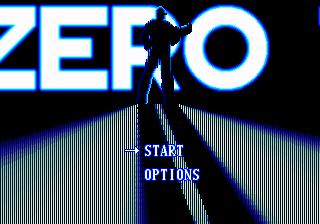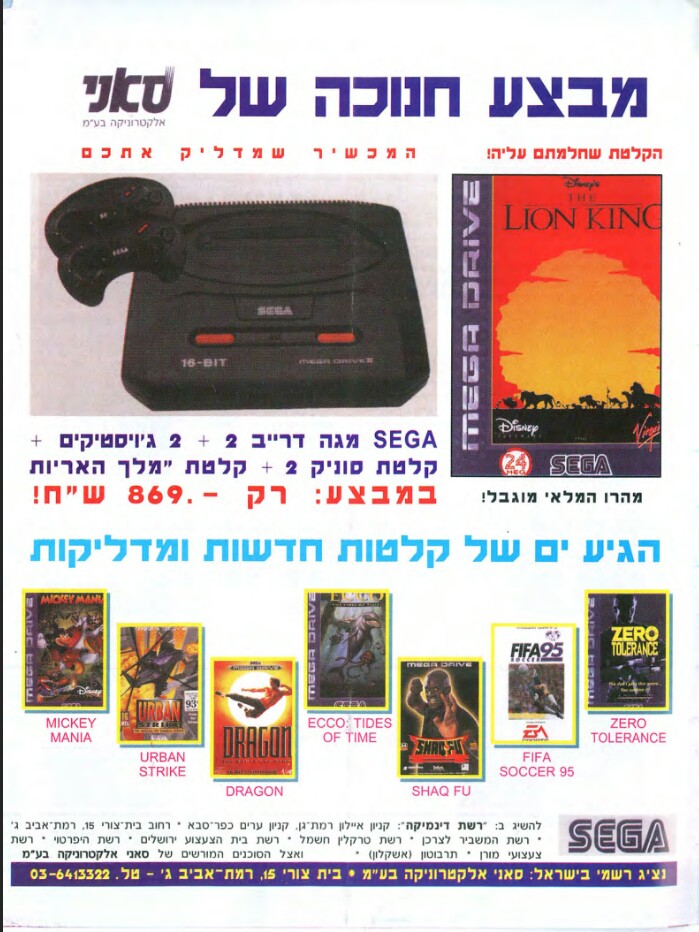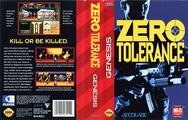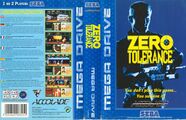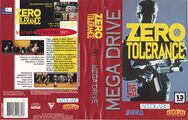Difference between revisions of "Zero Tolerance"
From Sega Retro
(info on multiplayer) |
|||
| Line 32: | Line 32: | ||
==Gameplay== | ==Gameplay== | ||
| − | Gameplay in | + | Gameplay in Zero Tolerance is similar to other first person shooters of the era, with the player controlling one of several characters navigating map from a third-person perspective, shooting enemies while trying to find an exit. (the player cannot continue to the next level without clearing all enemies) |
| + | Unusually for the time however, the game contains primitive stealth elements as player can crouch, jump and has several different melee attacks such as punching and even flying kicks can be executed. | ||
| + | Weapons include firearms and explosives such as dynamite and bouncing grenades. the player can hold only five items at a time, including weapons and inventory items. rooftop levels have snipers that cannot be taken out, and many of the HQ levels have security cameras that can be destoyed or avoided. | ||
| + | |||
| + | ==Rendering engine== | ||
| + | In terms of technology, ''Zero Tolerance'' lies somewhere between 1992's ''Wolfenstein 3D'' and 1993's ''[[Doom]]'' - rooms two dimensional as the height never changes (although the player's height can change slightly), and maps are "boxy", with walls are rendered as textured, flat surfaces positioned at 90 (or, unlike ''Wolfenstein 3D'', 45 degree) angles. | ||
Floors and ceilings are not textured, but primitive skyboxes are introduced and if the player shoots a wall, the texture will change to a "damaged" variant, in effect creating primitive interactive scenery. Enemies are rendered as sprites, and, also impressive for Mega Drive standards, are scaled in real-time. Shooting enemies will also create "gibs" similar to more modern shooters. | Floors and ceilings are not textured, but primitive skyboxes are introduced and if the player shoots a wall, the texture will change to a "damaged" variant, in effect creating primitive interactive scenery. Enemies are rendered as sprites, and, also impressive for Mega Drive standards, are scaled in real-time. Shooting enemies will also create "gibs" similar to more modern shooters. | ||
Revision as of 17:16, 5 March 2019
| Zero Tolerance | ||||||||||||||||||||||||||||||
|---|---|---|---|---|---|---|---|---|---|---|---|---|---|---|---|---|---|---|---|---|---|---|---|---|---|---|---|---|---|---|
| System(s): Sega Mega Drive | ||||||||||||||||||||||||||||||
| Publisher: Accolade | ||||||||||||||||||||||||||||||
| Developer: Technopop, Accolade | ||||||||||||||||||||||||||||||
| Sound driver: GEMS | ||||||||||||||||||||||||||||||
| Peripherals supported: Link-up cable | ||||||||||||||||||||||||||||||
| Genre: Shoot-'em-up | ||||||||||||||||||||||||||||||
| Number of players: 1 or 2 | ||||||||||||||||||||||||||||||
| ||||||||||||||||||||||||||||||
This short article is in need of work. You can help Sega Retro by adding to it.
Zero Tolerance is a first person shooter developed by Technopop and Accolade and published by Accolade for the Sega Mega Drive in 1994. It is notable for being one of the few first person shooters available for the system, a demanding genre seen by many to be outside the capabilities of the Mega Drive's hardware. Another unique feature was the ability to link two Mega Drive consoles to play a two player cooperative game .
Contents
Gameplay
Gameplay in Zero Tolerance is similar to other first person shooters of the era, with the player controlling one of several characters navigating map from a third-person perspective, shooting enemies while trying to find an exit. (the player cannot continue to the next level without clearing all enemies) Unusually for the time however, the game contains primitive stealth elements as player can crouch, jump and has several different melee attacks such as punching and even flying kicks can be executed. Weapons include firearms and explosives such as dynamite and bouncing grenades. the player can hold only five items at a time, including weapons and inventory items. rooftop levels have snipers that cannot be taken out, and many of the HQ levels have security cameras that can be destoyed or avoided.
Rendering engine
In terms of technology, Zero Tolerance lies somewhere between 1992's Wolfenstein 3D and 1993's Doom - rooms two dimensional as the height never changes (although the player's height can change slightly), and maps are "boxy", with walls are rendered as textured, flat surfaces positioned at 90 (or, unlike Wolfenstein 3D, 45 degree) angles.
Floors and ceilings are not textured, but primitive skyboxes are introduced and if the player shoots a wall, the texture will change to a "damaged" variant, in effect creating primitive interactive scenery. Enemies are rendered as sprites, and, also impressive for Mega Drive standards, are scaled in real-time. Shooting enemies will also create "gibs" similar to more modern shooters.
The consequence of all this is that the 3D view is constrained to a small portion of the screen, with the rest being taken by the game's HUD. The frame rate and draw distances are also lower than in both Wolfenstein 3D and Doom.
Multi-Player
In a similar manner to the Taisen Cable for the Sega Saturn released months later in Japan, Zero Tolerance is the only known official Mega Drive game to support linking 2 Mega Drive consoles to play a cooperative game between two players using a propietary link cable plugged into the Genesis second controller port. This mode required each console to be plugged to their own television and running their own copy of the game. The cable could only be obtained by sending off the order card which was included with the game.
History
Legacy
Zero Tolerance and its unfinished sequel, Beyond Zero Tolerance, were released by the developers as freeware.
Production credits
- Producer: Randel Reiss
- Assistant Producer: Desmond Crisis
- Design: Thomas Gjørup
- Art Direction: Scott Haile
- Programming: Justin Wolf, Thomas Gjørup
- Lead Artwork: Sheryl Knowles
- Level Designs: Tony Ramos
- Music: Dezso Molnar
- SFX: Dezso Molnar
- Voice Over: Maya Daniels
- Conceptual Art: Curtis E. A. Karnow
- Additional Support: Lasse Faabeng, Satoe Ishii, Jo Ellen Reiss, Patrick McEnvoy, Paul Puey
- Special Thanks: Steven Ackrich, Nick Laveroff, David Bamberger, Kelly Flock
- Producers: James Kucera, Troy Sheets
- Lead Tester: James A. Vitales
- Testers: Richard Gangwish, Alex V. Cabal, Ty Johnson, Randall Hauser, Seth Friedman, Daniel P. Dunn
- Marketing: Karen Safran, Megan Humpal, Larry Wiesler
- Executives: Alan Miller, John A. S. Skeel, Brenden Maloof, Jim Barnett, Peter Harris
- Art Director: Bob Busick
- Artists: Patricia Pearson, Craig Marshall, Dale Mauk, John Xu, Shawn Monroe, Scott Burroughs, Ken Capelli, Chris Peterson, Tom Denmark
Magazine articles
- Main article: Zero Tolerance/Magazine articles.
Promotional material
also published in:
- Sega Visions (US) #23: "February/March 1995" (199x-xx-xx)[5]
also published in:
- EGM² (US) #5: "November 1994" (1994-1x-xx)[6]
- Electronic Gaming Monthly (US) #65: "December 1994" (1994-xx-xx)[7]
Physical scans
| 80 | |
|---|---|
| Based on 36 reviews | |
| Mega Drive, SE (rental) |
|---|
|
References
- ↑ File:GamePlayers US 0710.pdf, page 12
- ↑ 2.0 2.1 File:GamePlayers US 0710.pdf, page 90 Cite error: Invalid
<ref>tag; name ":File:GamePlayers US 0710.pdf_p90" defined multiple times with different content - ↑ 3.0 3.1 3.2 3.3 File:CVG UK 155.pdf, page 85 Cite error: Invalid
<ref>tag; name ":File:CVG UK 155.pdf_p85" defined multiple times with different content - ↑ 4.0 4.1 File:Gamestar AU 05.pdf, page 58
- ↑ Sega Visions, "February/March 1995" (US; 199x-xx-xx), page 68
- ↑ EGM², "November 1994" (US; 1994-1x-xx), page 38
- ↑ Electronic Gaming Monthly, "December 1994" (US; 1994-xx-xx), page 74
- ↑ 8.0 8.1 File:GamesMaster UK 021.pdf, page 36 Cite error: Invalid
<ref>tag; name ":File:GamesMaster UK 021.pdf_p36" defined multiple times with different content - ↑ 9.0 9.1 File:MeanMachinesSega24UK.pdf, page 84 Cite error: Invalid
<ref>tag; name ":File:MeanMachinesSega24UK.pdf_p84" defined multiple times with different content - ↑ 10.0 10.1 File:VideoGames US 71.pdf, page 128 Cite error: Invalid
<ref>tag; name ":File:VideoGames US 71.pdf_p128" defined multiple times with different content - ↑ 1700 igr dlya Sega, "" (RU; 2001-xx-xx), page 273
- ↑ Consoles +, "Octobre 1994" (FR; 1994-xx-xx), page 110
- ↑ Cool Gamer, "9" (RU; 2002-10-13), page 244
- ↑ Computer + Video Giochi, "Dicembre 1994" (IT; 1994-xx-xx), page 114
- ↑ Digitiser (UK) (1994-12-01)
- ↑ Electronic Games (1992-1995), "October 1994" (US; 1994-xx-xx), page 88
- ↑ Electronic Gaming Monthly, "September 1994" (US; 1994-xx-xx), page 32
- ↑ Entsiklopediya luchshikh igr Sega. Vypusk 1, "" (RU; 1999-xx-xx), page 369
- ↑ Entsiklopediya luchshikh igr Sega. Vypusk 2, "" (RU; 2000-xx-xx), page 300
- ↑ GamePro, "November 1994" (US; 1994-xx-xx), page 94
- ↑ Gamers, "Januar 1995" (DE; 1995-01-08), page 36
- ↑ Games World: The Magazine, "November 1994" (UK; 1994-09-29), page 16
- ↑ Game Informer, "November 1994" (US; 1994-1x-xx), page 24
- ↑ Joypad, "Octobre 1994" (FR; 1994-xx-xx), page 116
- ↑ LeveL, "Únor 1995" (CZ; 1995-02-24), page 41
- ↑ Mega, "October 1994" (UK; 1994-09-29), page 44
- ↑ Mega Force, "Décembre 1994" (FR; 1994-12-02), page 56
- ↑ Mega Fun, "11/94" (DE; 1994-10-19), page 65
- ↑ Mega Play, "August 1994" (US; 1994-0x-xx), page 63
- ↑ Megazin, "Letnik 3, Številka 2, Februar 1995" (SI; 1995-xx-xx), page 31
- ↑ Player One, "Mars 1995" (FR; 1995-0x-xx), page 104
- ↑ Play Time, "11/94" (DE; 1994-10-05), page 106
- ↑ Power Up!, "Saturday, October 29, 1994" (UK; 1994-10-29), page 1
- ↑ Sega Magazine, "September 1994" (UK; 1994-08-xx), page 82
- ↑ Sega Power, "September 1994" (UK; 1994-08-04), page 40
- ↑ Sega Pro, "November 1994" (UK; 1994-10-06), page 54
- ↑ Sega Mega Drive Review, "2" (RU; 1996-01-03), page 181
- ↑ Sega Megazone, "September 1994" (AU; 1994-0x-xx), page 22
- ↑ Todo Sega, "Octubre 1994" (ES; 1994-xx-xx), page 64
- ↑ Tricks 16 bit, "Tricks Sega Gold 800 igr" (RU; 1998-03-20), page 28
- ↑ Video Games, "10/94" (DE; 1994-09-28), page 99
- Pages with reference errors
- 2 player games
- 1 player games
- US Mega Drive games
- All US games
- EU Mega Drive games
- All EU games
- PT Mega Drive games
- All PT games
- AU Mega Drive games
- All AU games
- BR Mega Drive games
- All BR games
- Mega Drive games
- 1994 Mega Drive games
- All 1994 games
- Mega Drive shoot-'em-up games
- All shoot-'em-up games
- Old content rating field
- Use romtable template
- All games
- Stubs
- Credits without reference
- GalleryPrintAd file defined
- Old-style rating (consolesplus)
- Rating without PDF source
- Old-style rating (cvg)
- Use magref
- Old-style rating (egm)
- Rating without source
- Old-style rating (gameplayers)
- Old-style rating (gamesmaster)
- Old-style rating (gamesworld)
- Old-style rating (joypad)
- Old-style rating (mms)
- Old-style rating (mega)
- Old-style rating (playerone)
- Old-style rating (segamaguk)
- Old-style rating (segapower)
- Old-style rating (segapro)
- Old-style rating (videogamesus)
- Update ratings template
- 14 old ratings
